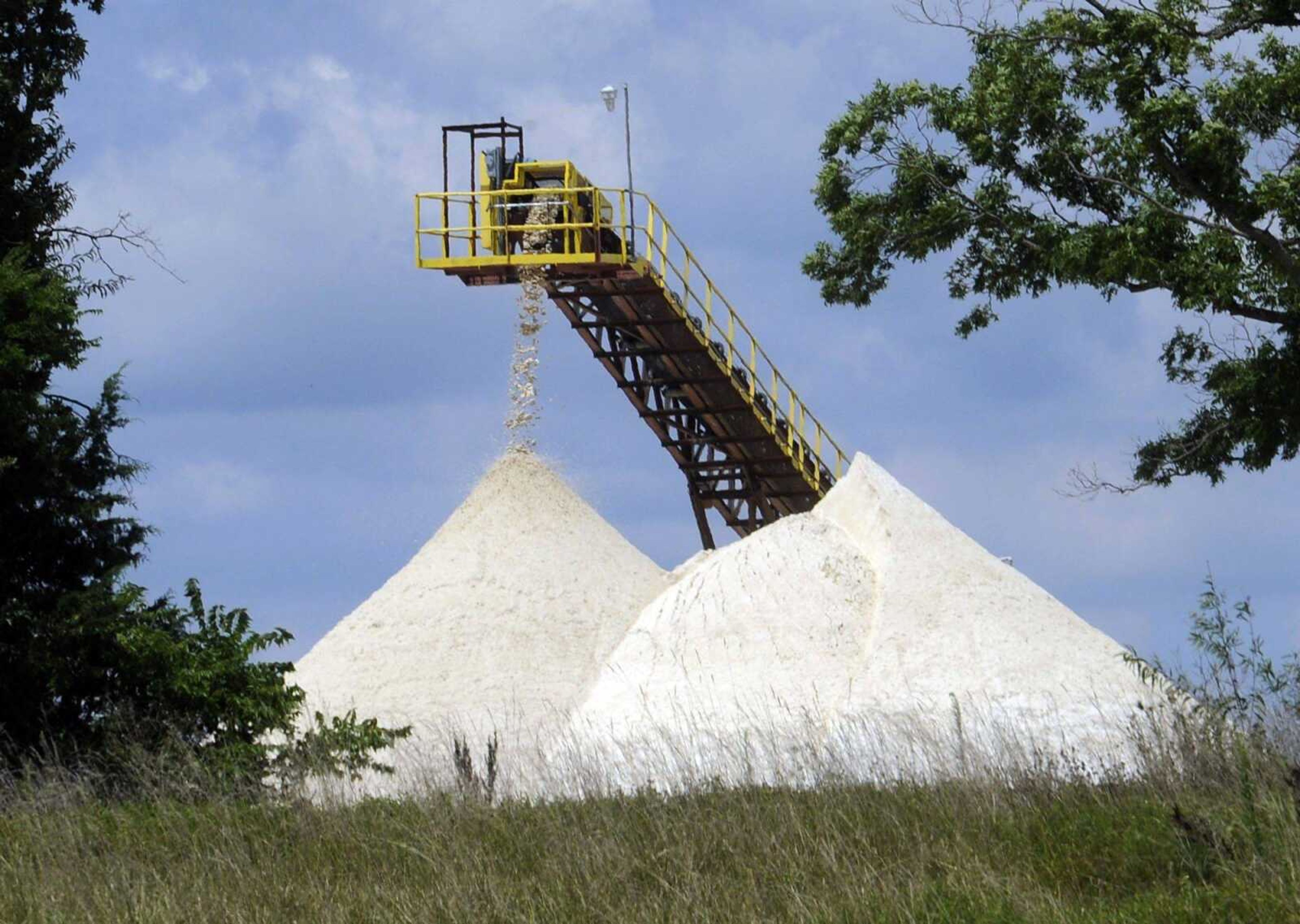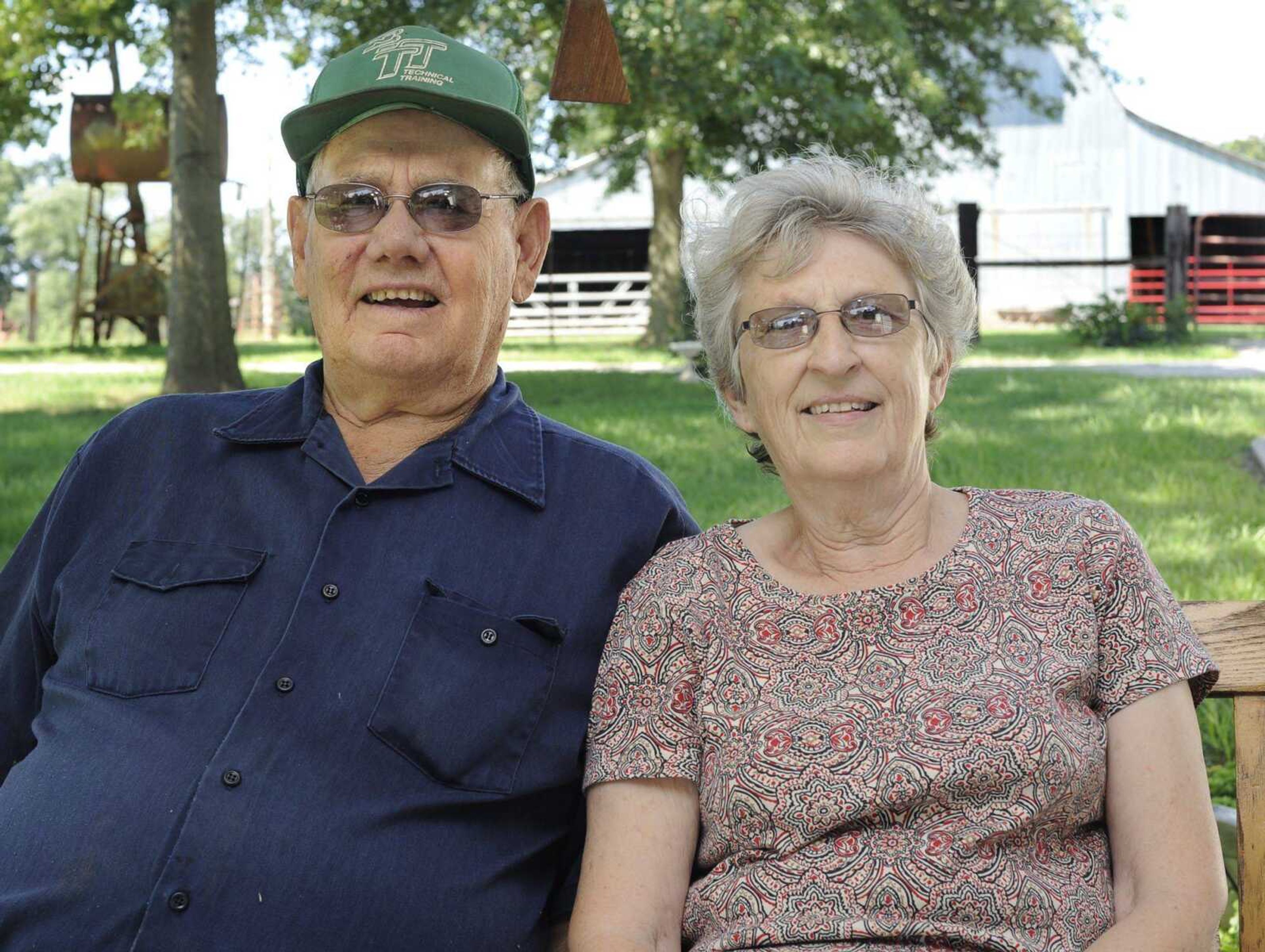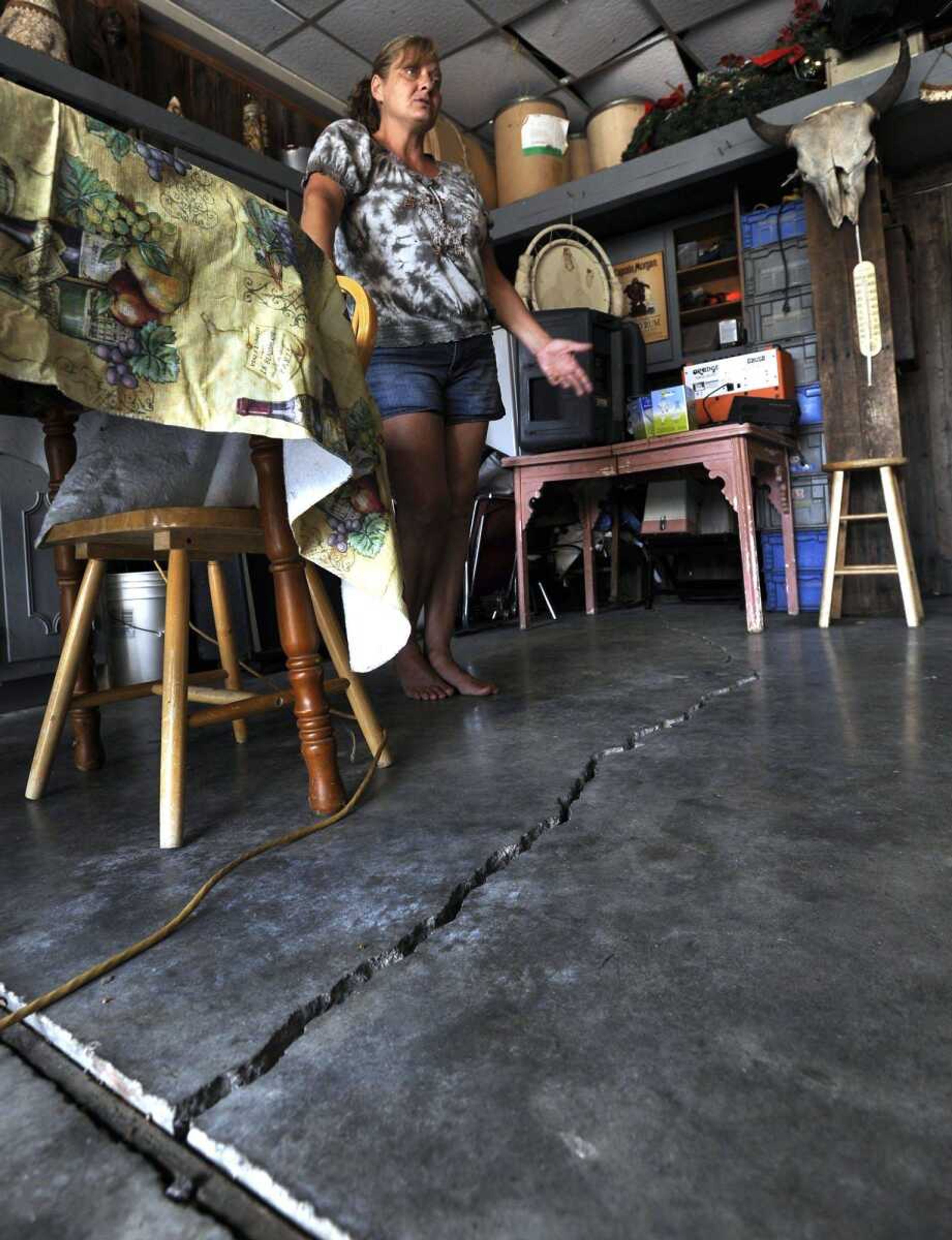Sand mine a source of irritation
BREWER, Mo. -- The sound of machinery hums in the distance as Gladys Renaud sits on a porch swing and sips from a wine glass. It's the Renauds' paradise. They've lived in their Perry County home for 52 years, surrounded by country and friendly neighbors...
BREWER, Mo. -- The sound of machinery hums in the distance as Gladys Renaud sits on a porch swing and sips from a wine glass. It's the Renauds' paradise. They've lived in their Perry County home for 52 years, surrounded by country and friendly neighbors.
Across the way on Route M, trucks drive in and out of a large industrial facility that provides dozens of jobs and takes up hundreds of acres. A mechanical arm reaches to the sky and adds sand to an already-standing mountain -- a material that assists in the release and collection of natural gas during hydraulic fracturing, or "fracking."
Families who live near the sand mine worry the facility's operations are harming their home and maybe their health.
Last month, Texas-based FTS International announced the silica sand mine and processing plant will idle operations after it sells it to Fairmount Minerals, due to "ongoing litigation with surrounding landowners and the potentially lengthy permitting process in Missouri" for operations of its type.

The 335-acre area the facility and operations occupies is off exit 135 from Interstate 55 and partly surrounded by homes. The Brewer plant is part of FTSI's "proppant" division and employs 53 people.
"The sale of FTSI's proppant assets to Fairmount will enable FTSI to streamline its business strategy and place greater focus on its core well completion business," Pamela Percival, director of corporate communications for FTSI, said in an email to the Southeast Missourian.
Proppants are sand or other materials used in fracking, a process that release oil and natural gas trapped underground. Fracking involves pumping a mixture of fluid and sand into the earth at pressures high enough to create fissures in rock. Proppants hold open cracks in a formation so the gas or oil can be accessed from above.
Battle in court
The Republic Monitor of Perryville, Mo., reported more than 70 people who live in homes around the plant are represented by Tom Burcham of Farmington, Mo., citing health concerns from breathing sand particulates and damage or potential damage to structures from the blasting required by the sand mining process.
Burcham said his office has no comment on the litigation.

Percival said litigation between FTSI and property owners has been ongoing, but did not comment further.
Neighboring families have been dealing with the consequences of blasting from the plant for years, and they are ready to their have homes fixed and put their minds at ease.
Terri Adams lives with her husband and four of their five children in a home not far from the FTSI plant. The Adams family has lived in the house for about nine years, and is involved in the litigation, citing property damage.
Adams showed cracks in the concrete of her garage and foundation of her home. The family has never parked a car in their garage, so the weight of a vehicle could not have caused the large crack that started developing about four years ago, she said.
The cracks on their basement wall and foundation cause major flooding in their basement, and the family has pulled up all the carpet from the basement floors and removed all Sheetrock from the basement walls and replaced it with cardboard.
Adams said they started noticing damage to their home six months to a year after the FTSI plant began operating in August 2007, and the flooding problem began immediately after.
"We never had that happen before this started," Adams said. "As long as it rains, it keeps pouring in."
Adams' husband has patched a crack in the basement three or four times. They dug a hole in the basement floor so they could insert a sump pump and drain flood water reaches up to 6 to 8 inches deep.
Adams said it feels like an earthquake when the plant blasts about twice a week.
Although her family's health hasn't been affected, she said the plant is harming her family's lives.
"I have no idea in hell why they would put something like that in a residential area," Adams said, acknowledging the many children that live in their neighborhood.
In Perry County, as with many counties in Southeast Missouri, there are no zoning regulations. So the coexistence of facilities such as FTSI and surrounding homes isn't prohibited.
Adams said it would be rough for the people who would lose their jobs if the plant closes, but she wants it gone.
"It's affecting our lives," she said. "In the long run, we live with it every day, every day, every day."
The Renauds have lived in their house on another side of the property surrounding FTSI long before the plant was built. They also are involved in the litigation, citing property damage.
The couple has opposed the plant since the beginning, and they attended all the public meetings involving construction of the facility.
"They just kept making deeper holes and bigger mountains," Gladys Renaud said.
The Renauds said they still hear the blasting at times, but not as often as they used to, noting they filed the lawsuit in December 2011.
"And that's about when the shaking quit," Gene Renaud said.
Cracks in the foundation of their home are visible from the outside, and Gladys Renaud said their kitchen pantry has dropped about an inch. As for health problems, the couple doesn't have any.
"Well, not yet," Gene Renaud said. "We don't know, we don't know how much of it we breathe."
The Occupational Safety and Health Administration website says sand used in fracking contains silica, which can cause silicosis when inhaled. Silicosis is a disease in which lung tissue reacts to the silica particles and becomes inflamed and scarred, making oxygen intake harder. Silica also has been linked to lung cancer, tuberculosis and other diseases.
Opening again?
The Renauds said they were not sure whether the plant would be closed for good when the sale to Fairmount Minerals is complete. Gladys Renaud said she heard the plant was going to close, switch names and resume operations.
In an email to the Southeast Missourian, Percival said, "Because of ongoing litigation with landowners surrounding the Brewer facility, Fairmount chose not to purchase the actual mine property as part of the asset sale from FTSI. Fairmount has only agreed to purchase the equipment used at the mine. The Brewer facility, located near Perryville is scheduled to be idled. Future options for the Brewer facility are still under review."
Getting a state mining permit could take up to four and a half weeks if the public requests a formal hearing. Then the public would have to convince the Land Reclamation Commission that health and safety of livelihood would be harmed by issuing the permit, according to the Missouri Department of Natural Resources website. Then there is a hearing process, and the final decision is made by the Land Reclamation Commission, the only legal body of state government that can make the final decision.
"FTSI's facility in Brewer has all of the necessary environmental permits issued by the Missouri Department of Natural Resources to continue mining operations, including a permit to engage in surface mining, a permit issued under the air pollution control program, and a state operating permit issued in compliance with the Missouri Clean Water Law," Percival said in an email. "FTSI was first issued a permit to engage in surface mining in January 2007, and FTSI recently renewed this permit in order to continue mining operations through January 2016."
Gena Terlizzi, communications director for the Missouri Department of Natural Resources, said when a mine changes owners, companies may apply for a permit transfer to continue operations. To date, Fairmount has not submitted a permit transfer application to the Department of Natural Resources Land Reclamation Program, Terlizzi said.
The sales transaction is expected to be complete by the end of September.
adowning@semissourian.com
388-3632
Pertinent address:
312 Highway M, Perryville, MO
Connect with the Southeast Missourian Newsroom:
For corrections to this story or other insights for the editor, click here. To submit a letter to the editor, click here. To learn about the Southeast Missourian’s AI Policy, click here.









